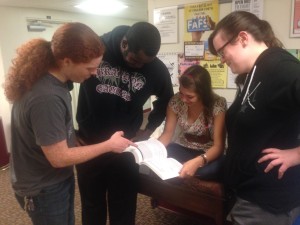New Wilson Charter Officially Approved

Photo Provided by Shoshana Rudski
A small number of alumnae have been fighting the decision to go coeducational since the day the decision was made. Over this past summer of 2014, a hearing was held for the alumnae to voice their concerns and speak their opinions. Four alumnae spoke as representatives for the 40 members who registered complaints with the change in the charter.
Months after the hearing, the Pennsylvania Department of Education (PDE) officially approved the changes to the Wilson College Charter for the campus to be recognized as a coeducational institution over winter break on Jan. 6, 2015.
A charter is a document that depicts how an institution will run itself, and as the decision was made to go from an all-female campus with a coeducational Adult Degree Program (ADP) to a completely coeducational campus, our charter needed to be updated.
This long-awaited process began in the fall of 2012 when a commission process was asked to discover ways to help the school’s enrollment issues.
The decision to become a coeducational institution was made by the board in January 2013. In March 2013, this decision was then brought to the PDE to change the charter to fit Wilson’s new population. The PDE then published the charter in July 2013 for 30 days to allow members of the public to voice their concerns. 40 alumnae registered complaints with the charter, which automatically called for a hearing. The date of the hearing was set for June 2014.
“Everybody’s opinion is valid and important, and I’m glad they got the opportunity to be heard,” said Dean of Students, Mary Beth Williams when asked about the hearing. “It was a way for the alumnae to make their voices heard. It really was truly a hearing, rather than a trial.”
The alumnae were able to voice their concerns in a manner that allowed them to be truly heard. Many of the complaints were focused on the fact that Wilson had begun preparing for the move to coeducation before the charter was approved. Due to multiple changes in position at the PDE, the timeline for the charter was drawn out. This discrepancy was the cause of many of the complaints from the alumnae.
“No one expected the timeline to be prolonged. So the dispute over when we went coed should not have happened if the anticipated timeline occurred,” said Brian Speer, Vice President for Marketing and Communications.
This extended time period has caused feelings of resentment in both the students and the alumnae. The continued dispute over the move to become a coeducational institution has caused students to become hesitant when interacting with alumnae. There have been groups on social media sites that continue to show anger towards the current students, which have furthered the frustration between student and alumnae.
“I hope that clarifying this issue will allow all students and all alumni to move forward in a positive direction,” said Dean Williams. She comments that her interactions with many of the alumnae have been very positive. “The overwhelming majority of the alumnae have been supportive of me, and the direction the college is moving in.”
Now that the charter has been officially approved, the hope is that much of the dispute is over so that students and alumnae can begin to rebuild relationships.
“From the Dean of Students point of view, I look forward to the time that all alumni are supportive of all students and I hope that this will do it.”
Dean Williams knows how much a few disgruntled alumni can affect the students and is hopeful that this decision will allow the college to move forward. “Wilson is headed in an awesome direction, we just need to move beyond this to where we can all support one another.” With a smile on her face she added, “Now we just need to be awesome.”
When asked what to do if the few alumni come back for another round, Dean Williams said, “I am the Dean of Students and I will do anything to protect our students.”

